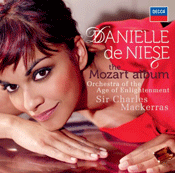The Mozart Album, however, is a cautionary tale of sorts that serves as a reminder that Mozart is not to be taken lightly. Ask any vocalist or instrumentalist, Mozart is the most difficult composer to perform. Why? Mozart demands technical perfection, a superior level of musicianship, subtle phrasing and a command of the musical drama. In short, he demands everything!
In The Mozart Album, de Niese runs the gamut of repertoire from sacred arias, to concert arias, to opera arias, and, finally, to a duet with baritone Bryn Terfel. She begins with Exsultate, jubilate (K165), a motet for soprano, organ, and orchestra in three movements. Throughout, de Niese displays incredibly accurate coloratura lines gleaming with color. Notably absent, however, are a consistent legato and warmth in the lines. At times there is a strange straight-tone quality within the phrases that make no stylistic sense and that tends to distract the listener. While the first two movements are lacking in drama, she performs “Alleluia, ” the third movement and certainly the crown jewel of the motet, with high-flying coloratura lines and finessed phrasing. These inconsistencies in performance quality, unfortunately, plague The Mozart Album.
In the concert aria “Bella mia fiamma, addio!,” Ms. de Niese’s performance is much more secure with support and warm returning to the voice, even in the legato lines. The opening recitative is infused with drama from the outset, the escalating phrases captivating the listener. Within the aria, there are brilliant, but fleeting, moments of clarity. Throughout the aria, the listener can hear air escaping during the execution of the tone, making the sound quite fuzzy. “Bella mia fiamma” requires strength in the tone because of its bold harmonic nature and expansive range, and without that, the intended effect of the piece is lost.
If the purpose of The Mozart Album is to “show her stuff,” de Niese’s selection of “Al desio di chi t’adora” is a puzzlement. One of many alternate arias to “Deh, vieni, non tardar, ” “Al desio” pales against “Deh, vieni,” the greatest test of the lyric soprano that demands excruciating long lines, incredible vocal support, delicate shaping within the vocal lines, and an ability to release the drama while maintaining control. Instead, “Al desio” gives us more of the same — short phrases and an abundance of coloratura — all with a lack of sensitivity.
The middle selections are the highpoint of this recording, which include “Una donna a quindici anni,” “Padre, germani, addio!”, and “Ah! fuggi il traditor.” Despina’s aria is full of fiery energy, the Italian facilitating her brilliant comic vocal lines. The aria from Idomeneo, the first of Mozart’s great operas, is quite similar to Handel’s writing style, although Mozart injects more drama within the music and utilizes more complicated forms and harmonic structures than Handel. Ms. de Niese seems to be at her most comfortable in this piece. The aria is full of moving lines and coloratura, the tessitura particularly highlighting the beautiful parts of her voice.
Donna Elvira’s aria “Ah! fuggi il traditor!” from Giovanni proves a pleasant surprise. De Neise comments, “Although I have not yet sung Elvira on the stage, this aria really represents the direction I’m heading in vocally, as my voice is growing a lot.” Her Elvira is bursting with anger, and she seems to grab hold of the extensive range and disjunct intervals with power and ease. This aria is a tour de force, but inasmuch as it is less than two minutes in duration, it is difficult to discern whether her voice is capable of singing the entire role. I am hopeful that she continues to move in this stronger, fuller lyric direction.
The penultimate selection is the duet “La chi darem la mano” from Don Giovanni, performed with Bryn Terfel. Ms. de Niese follows his lead regarding the musical phrases, and allows much more finesse to shape her vocal line. But, the final selection, “Laudate Dominum” (from Vesperae solennes de confessoreis (K339)), is another disappointment. This piece requires considerable vocal control and support to navigate the large leaps and long, soaring phrases. Yet, in endeavoring to maintain the solemn character of the piece, her performance lacks the energy that predominates in her highly dramatic selections. Also, the Apollo Voices are not polished in the choral comments. There is a lack of blend, with the phrasing being more disjointed than soaring and Mozartian.
This album says a great deal about Ms. de Niese’s vocal direction. Her voice continues to maneuver coloratura with great aplomb, yet the legato lines that are needed for her to move into fuller lyric coloratura repertoire are not yet worked out. In the liner notes, Brian Dickie reveals that many of the pieces on this album were first performed in the soprano’s high school years, and I suspect that her technical delivery of this music is influenced by her initial exposure to the repertoire. Perhaps another Mozart album will bring forth the fuller, dramatic repertoire that Ms. de Niese is growing into. And I suspect that as her voice grows into its own, her Mozart will become fuller, more grounded, and easily shaped to truly convey the composer’s musical and dramatic intentions.
Sarah Luebke
